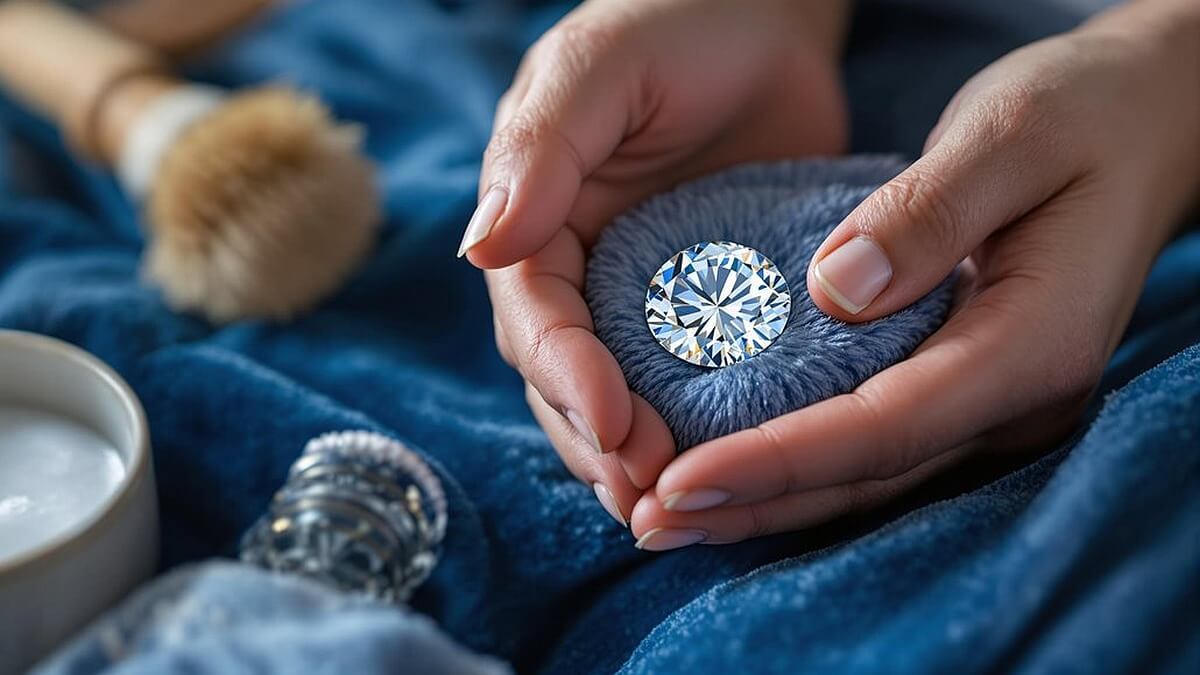In This Article
- Article Summary
- Leading Certification Bodies for Lab-Grown Diamonds
- GIA vs IGI Certification: Key Differences
- Why Certification Matters for Ethical and Transparent Sourcing
- How to Verify a Certified Lab-Grown Diamond
- The Role of Certification in Pricing Lab-Grown Diamonds
- The Future of Lab-Grown Diamond Certification
- Our Final Thoughts About Lab Diamond Certification
- Lab Diamond Certification and After Diamonds
- FAQs
Lab diamond certification serves as the cornerstone of trust in an industry where authenticity matters. "Certification provides the documentation consumers need to validate their purchase," explains diamond expert Sarah Collins.
These certificates, issued by organisations like GIA and IGI, verify a diamond's origin, quality, and ethical sourcing—crucial elements in today's conscientious marketplace. But not all certifications offer the same level of protection, leaving consumers to manoeuvre through a complex system of standards and terminology.
Article Summary
- Certification from bodies such as GIA, IGI, and AGS verifies a lab-grown diamond's authenticity, quality, and ethical sourcing.
- GIA offers rigorous standards while IGI provides faster, cost-effective certification specifically tailored for lab-grown diamonds.
- Certified lab diamonds ensure transparency through documented proof of origin, guaranteeing conflict-free and sustainable production.
- Verification features include checking certificates, examining laser inscriptions, and purchasing from reputable retailers.
- Certification significantly impacts pricing, increasing market value while providing consumers with assurance about the quality of their investment.
Lily Lab Pear Diamond Solitaire Engagement Ring 0.50ct D/VVS 18k White Gold
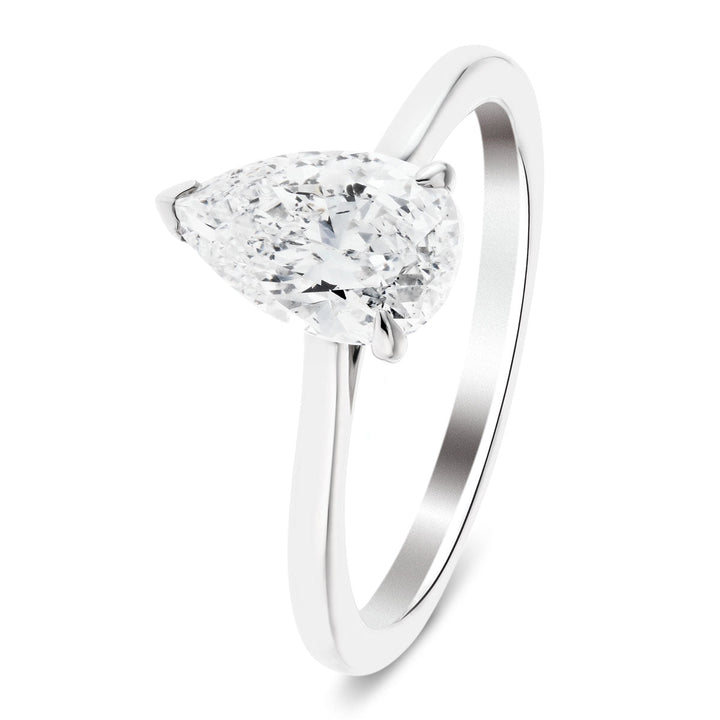
£585.00
£1,121.00
This Lily Lab Pear Diamond Solitaire Engagement Ring is a true masterpiece. Handcrafted in the UK and hallmarked for authenticity, this 0.50ct D/VVS solitaire diamond is set in a lustrous 18k white gold band. The diamond's incredible clarity and sparkle… read more
Leading Certification Bodies for Lab-Grown Diamonds
Trustworthiness forms the foundation of any diamond purchase, especially in the growing lab-created market. When comparing certification organisations, three names consistently lead the industry: GIA, IGI, and AGS.
"GIA represents the gold standard," industry experts note, applying rigorous diamond grading criteria to every stone they evaluate. Their reports are highly respected but may take longer to obtain.
IGI offers a more cost-effective and faster option without sacrificing quality, making it a favourite among major retailers.
AGS stands out for its scientific approach and detailed analysis of cut quality and light performance.
Consumer certification awareness continues to grow as buyers recognise the importance of third-party verification from these respected organisations before making significant purchases. This trend aligns with the increasing consumer interest in sustainable and conflict-free options as they seek ethically sourced gemstones.
GIA vs IGI Certification: Key Differences
When selecting a certification for lab-grown diamonds, consumers often find themselves choosing between GIA and IGI, the two most prominent authorities in diamond grading.
The GIA certification is widely regarded as the industry's gold standard, offering exceptional consistency and reliability. GIA inscribes each diamond's girdle with a report number, providing superior diamond authenticity assurance.
Nonetheless, IGI certification has distinct advantages for lab-grown stones, including faster processing times and lower certification costs.
The GIA IGI comparison reveals important certification grading differences. While GIA maintains the strictest standards, IGI has developed specific grades customised to lab-grown diamonds.
"Understanding these differences is vital for making informed purchases," experts note. Additionally, consumers should recognise that lab-grown diamonds are more affordable than natural diamonds, further emphasising the importance of certification to ensure value.
Consumers should consider their priorities—whether that's the prestige of GIA or the specialised approach of IGI for lab-created diamonds.
Chloe Lab Diamond Halo Oval Engagement Ring 0.85ct G/VS in Platinum
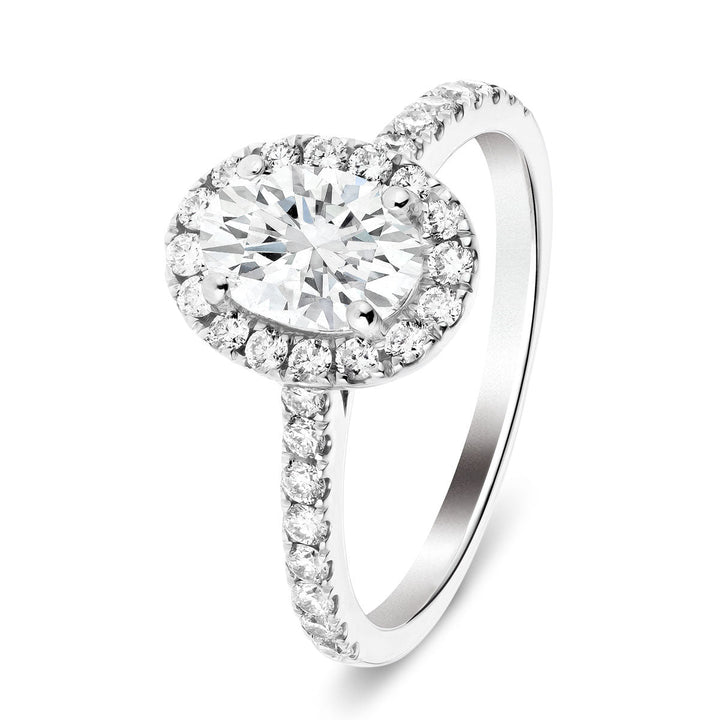
£1,035.00
£1,976.00
Indulge in the ultimate symbol of love with the luxurious Chloe Lab Diamond Halo Oval Engagement Ring, expertly crafted by hand in platinum. This breathtaking ring boasts a 0.85-carat total weight of G/VS-graded diamonds, with an oval cut diamond at… read more
Why Certification Matters for Ethical and Transparent Sourcing
Beyond the technical aspects of diamond grading, certification serves a deeper purpose in today's ethical marketplace. Certificates provide the documented proof that consumers need to verify their diamonds' origins—a vital element of ethical sourcing.
"Certification creates accountability throughout the supply chain," industry experts note. For lab-grown diamonds, this transparency importance cannot be overstated, as it guarantees their conflict-free status.
Consumer awareness has increased significantly regarding diamond origins. When customers receive certified lab diamonds, they gain:
- Confirmation of sustainable production methods
- Assurance against "blood diamond" concerns
- Documentation of reduced environmental impact
This paper trail transforms abstract claims about ethics into verifiable facts, allowing buyers to make purchases that align with their values without compromising on quality.
How to Verify a Certified Lab-Grown Diamond
Verifying the authenticity of a lab-grown diamond requires specific steps that protect consumers from potential fraud. The certification process involves several reliable verification methods that guarantee diamond authenticity.
Experts recommend checking for:
- GC and GRA certificates from recognised gemmological institutions
- Laser inscriptions indicating lab creation
- Using diamond testers to distinguish between natural and lab-grown stones
"Certification provides the cornerstone of trust in the lab diamond market," note industry experts. These documents verify not just origin but also the diamond's quality attributes including cut, clarity, colour, and carat weight.
Purchasing from trusted retailers adds another layer of protection.
When combined with proper documentation, buyers can feel confident their investment reflects both quality and value.
Lab Diamond Flower Cluster Pendant Necklace 0.10ct in 9k Rose Gold
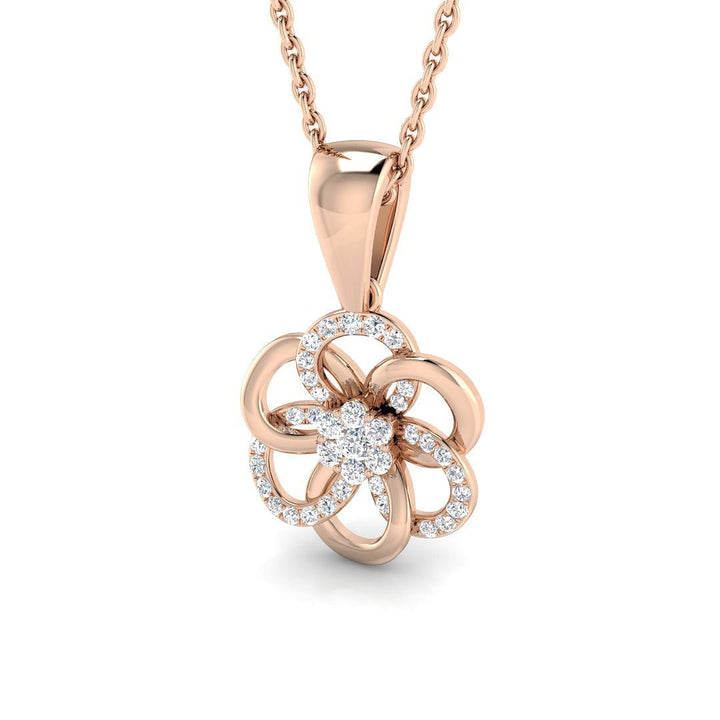
£240.00
£545.00
This exquisite Lab Diamond Flower Cluster Pendant Necklace, featuring 0.10ct of premium D/VVS quality diamonds, epitomizes elegance and sophistication. Each round-shaped diamond is meticulously set in a charming flower cluster design, creating a mesmerizing sparkle. Crafted in luxurious 9k rose… read more
The Role of Certification in Pricing Lab-Grown Diamonds
Certification plays a significant role in determining the market value of lab-grown diamonds. When a stone receives official grading from trusted institutions like GIA or IGI, its price typically increases owing to verified quality assurance.
"Certification acts as a pricing factor as it validates the exact specifications of each stone," industry experts note. The detailed reports document carat weight, colour, clarity, and cut quality—all crucial elements that influence value.
Market trends show that certified lab-grown diamonds command higher prices and better resale value than their uncertified counterparts. Without professional certification, consumers risk purchasing diamonds of lesser quality than advertised.
For budget-conscious shoppers pursuing quality assurance, certification provides peace of mind that their investment meets established industry standards.
Pave Set Lab Diamond Paperclip Earrings 1.50ct D/VVS in 925 Silver
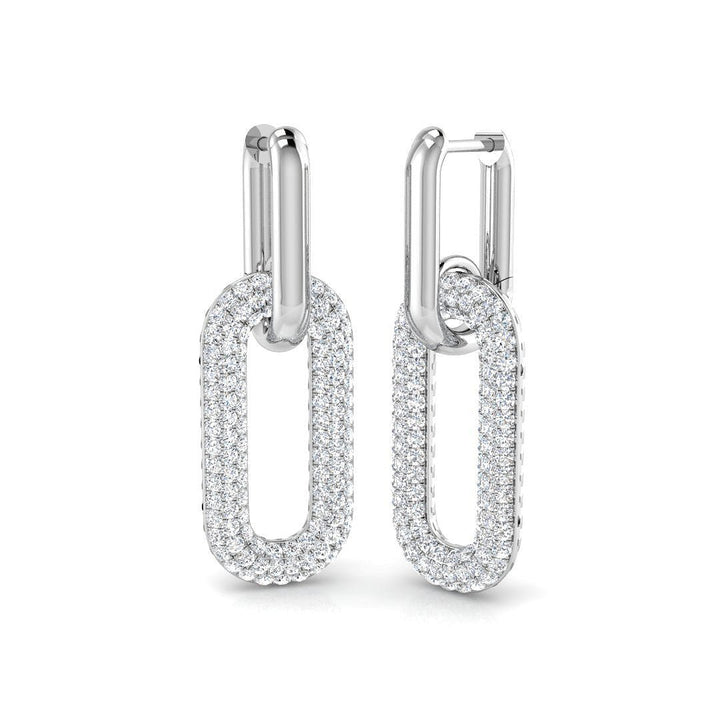
£830.00
£1,495.00
These exquisite Pave Set Lab Diamond Paperclip Earrings, boasting a total diamond weight of 1.50ct, epitomise modern elegance and craftsmanship. Each lab diamond, meticulously selected for its D/VVS quality, sparkles in a pave setting, enhancing the striking design. Crafted with… read more
The Future of Lab-Grown Diamond Certification
What lies ahead for lab-grown diamond certification appears increasingly sophisticated and technology-driven.
As GIA and other organisations refine their processes, emerging trends suggest even more detailed reporting on diamond characteristics.
"Certification will play a vital role in consumer education as the market evolves," industry experts note. Improved technological capabilities will likely enable certification bodies to detect subtle differences between natural and lab-grown diamonds with greater precision.
The market evolution points towards:
- More accessible digital certification records
- Blockchain integration for certification transparency
- Advanced grading tools for greater consistency
As lab-grown diamonds continue gaining acceptance, certification standards will likely adapt to meet changing consumer expectations as well as maintaining the rigorous quality assessments that build trust in these sustainable substitutes.
Our Final Thoughts About Lab Diamond Certification
Certification serves as the cornerstone of trust in the lab-grown diamond industry. Although some argue that certifications add unnecessary cost, they provide vital protection against misrepresentation and fraud. As technology evolves, certification standards will likely become more sophisticated, offering consumers improved confidence in their purchases. In the end, reputable certification transforms lab-grown diamonds from mere substitutes into legitimate, ethical choices backed by verified documentation and transparent practices.
Rub Over Drop Earrings 2.00ct D/VVS Lab Diamonds in 9k Yellow Gold
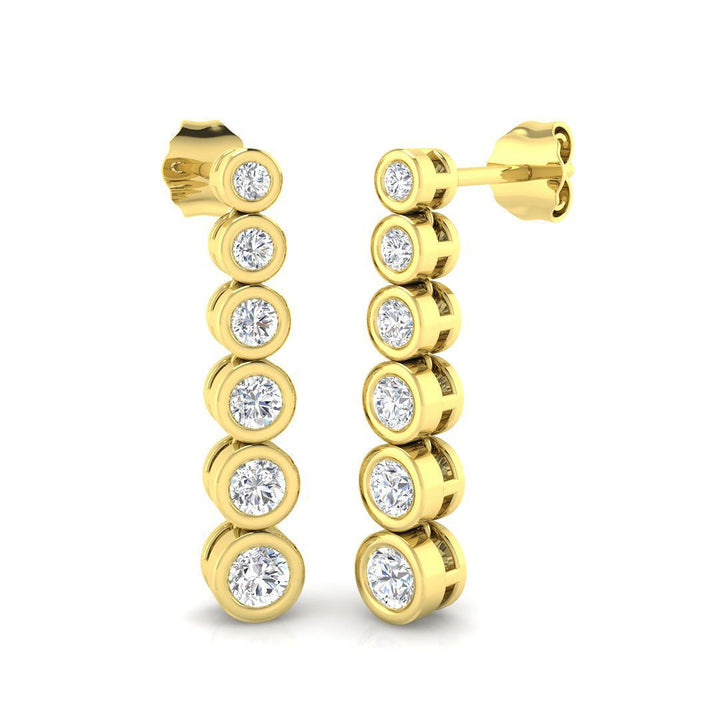
£1,150.00
£2,555.00
These Rub Over Drop Earrings, showcasing a total of 2.00ct D/VVS lab diamonds, epitomize modern elegance in their design. Each earring features securely bezel-set, round diamonds, radiating brilliance and quality. Crafted in lustrous 9k yellow gold, they measure 28.4mm in… read more
Lab Diamond Certification and After Diamonds
At After Diamonds, we understand the importance of trust and transparency when it comes to purchasing fine diamond jewellery. Our commitment to these values is reflected in our exquisite collection of lab-grown diamond pieces, each designed and handcrafted in the UK by our skilled artisans.
We stand behind the quality of our creations with a lifetime workmanship guarantee, ensuring your investment is protected for years to come.
We invite you to explore our online store at afterdiamonds.co.uk, where you'll discover a stunning array of meticulously crafted jewellery that embodies both elegance and ethical responsibility. Experience the brilliance of lab-grown diamonds and the unparalleled craftsmanship that defines After Diamonds.
FAQs
How do lab-grown diamonds compare to natural diamonds in terms of durability and lifespan?
Lab-grown diamonds possess the same chemical composition and physical properties as natural diamonds, making them equally durable. Both types rank at the top of the Mohs hardness scale, ensuring they can withstand daily wear and last a lifetime.
Can lab-grown diamonds be insured in the same way as natural diamonds?
Yes, lab-grown diamonds can be insured similarly to natural diamonds. It's advisable to have a certified appraisal detailing the diamond's specifications and value to facilitate the insurance process.
What are the environmental and ethical advantages of choosing lab-grown diamonds over mined diamonds?
Lab-grown diamonds often have a smaller environmental footprint, as their production doesn't involve mining, which can lead to habitat destruction and other ecological issues. Additionally, they are typically free from concerns associated with conflict diamonds, ensuring a more ethical choice.
Are there specific care instructions for maintaining the brilliance of lab-grown diamonds?
Lab-grown diamonds require the same care as natural diamonds. Regular cleaning with mild soapy water and a soft brush, along with periodic professional inspections, will help maintain their sparkle and ensure the settings remain secure.
How does the resale value of lab-grown diamonds compare to that of natural diamonds?
Lab-grown diamonds generally have a lower resale value compared to natural diamonds. This is due to factors like market perception and the lower production costs of lab-grown diamonds. It's important for buyers to consider this aspect when making a purchase.


